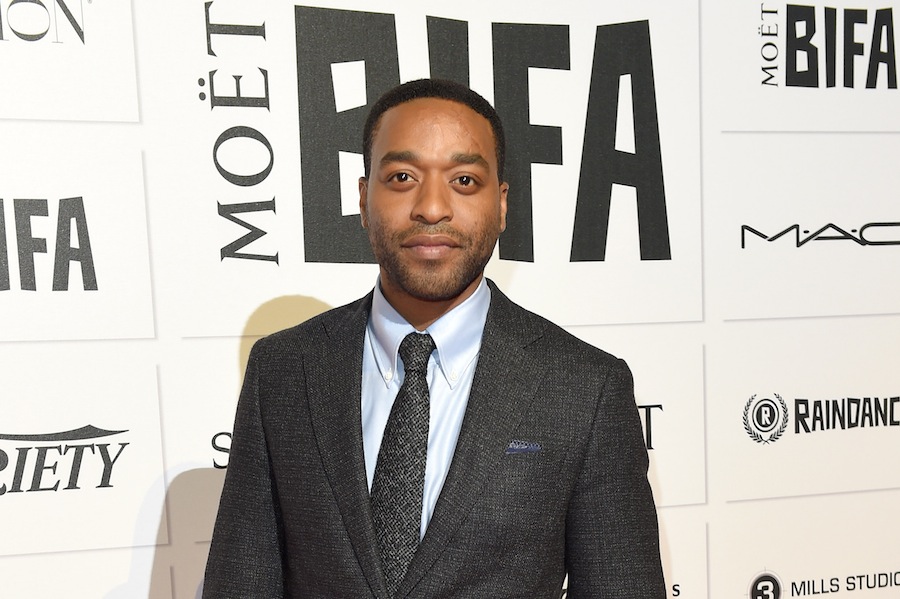Chiwetel Ejiofor has played villains before, including in “Four Brothers” and Joss Whedon’s “Firefly” spinoff “Serenity.” But he’s never gone full-on tough guy before.
In “Triple 9,” he plays an ex-mercenary who’s returned home and joined a gang of thieves forced to do bank heists at the behest of a Russian mafia head (played by Kate Winslet). The Oscar-nominated English actor, 38, had to get into a very bleak headspace — as well as learn how to shoot a big gun. RELATED: Interview: Aaron Paul talks ‘Triple 9’ and what it’s like going on ride alongs It seems every actor had an interesting research period. The ones playing cops went on wild ride alongs. What was your prep? RELATED: Interview: What RJ Mitte wants to do most is an action film Were you surprised while talking to the SEALs? We don’t like to talk to soldiers about their experiences and how it changed them, just like we don’t like to talk to people who’ve done something horrible. We’d rather forget they exist. RELATED: Study confirms that Hollywood has a diversity problem This is arguably the toughest character you’ve played. The character you play in “Serenity” is more evil, but he’s almost gentle, rational about it, which makes him scarier. RELATED: Interview: Kiefer Sutherland talks “Forsaken” and sharing the screen with his father This seems like the most physically draining film you’ve done since David Mamet’s “Redbelt,” where you played a martial artist. How does that physicality affect your performance?
Just shooting a lot of guns with Navy SEALs. I’ve done some gunplay in films, but not like this. I didn’t grow up with guns, so I had to be like, “OK, this is what happens.” They took me through it over several months and just did tactical training and shooting and getting to know these guys and their experiences and building a backstory for Michael. I just wondered what that looks like in the real world — somebody who is more at home robbing a bank than talking to the wife or their children. It’s a fascinating jump-off point for a person. What are the experiences that led somebody down this road, this moral gray area?
Any kind of normalized conversation that discusses how you kill people is weird. If you’re not from that background, if you’re not from that kind of world, it’s constantly surprising because [to them] it’s normal. You do start to feel that you have some insight into what the fog of war looks like. Then you wonder exactly that: What do you do with that skillset when you return back to the world, back to the States? Everything is sort of normal. Then you start to understand why these characters might exist — like why, if you’re [his character] working with Blackwater or whatever, doing jobs for the Russian mafia might be appealing.
I just rewatched that YouTube clip of those guys running over the Iraqi woman. What does that feel like? Not just the guy who committed the crime, but everybody else in there. All of them crossed the line that day. They don’t get that back, morally, and you wonder what that feels like. What’s the extent of that 10 years later — what your moral, ethical concepts are and how do those things change once you engage in stuff like that?
The Operative was an extraordinary character to play just because of exactly that reason. I haven’t seen in cinema a character that so clearly justifies the murder of children. There was no limit to that character. He was going to go all the way.
It’s sort of that the language is just more physical. You explore the characters through physicality. “Redbelt” was in jui-jitsu. I fell in love with jui-jitsu after that. [Jiu-jitsu] was the one thing I would carry on doing if I wasn’t an actor. The language of that physicality is like chess. The characters are informed by that physicality, and in a way I think that’s true of [“Triple 9”] — being so familiar with the fog of war that it changes the way you move around anything and around everybody. That becomes a real character detail.
Chiwetel Ejiofor learned how to shoot a gun for ‘Triple 9’

Getty Images
Follow Matt Prigge on Twitter @mattprigge




















